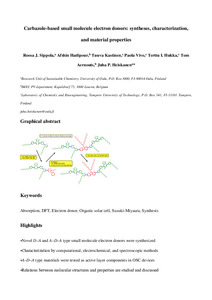Carbazole-based small molecule electron donors : Syntheses, characterization, and material properties
Sippola, Roosa J.; Hadipour, Afshin; Kastinen, Tuuva; Vivo, Paola; Hukka, Terttu I.; Aernouts, Tom; Heiskanen, Juha P. (2017-11-08)
Sippola, Roosa J.
Hadipour, Afshin
Kastinen, Tuuva
Vivo, Paola
Hukka, Terttu I.
Aernouts, Tom
Heiskanen, Juha P.
08.11.2017
j.dyepig.2017.11.014
Julkaisun pysyvä osoite on
https://urn.fi/URN:NBN:fi:tuni-202002132062
https://urn.fi/URN:NBN:fi:tuni-202002132062
Kuvaus
Peer reviewed
Tiivistelmä
Efficient synthetic methods for carbazole-based small molecule electron donors with donor–acceptor (D–A) and A–D–A type structures were developed. In order to study the relation between chemical structures and material properties, the prepared compounds were characterized in detail using absorption spectroscopy, differential pulse voltammetry, and computational methods. In addition, symmetrical A–D–A type compounds were tested as an active layer component in bulk heterojunction based organic solar cell (OSC) devices with conventional structure. The results show that the two compound types have many similar properties. However, the extended molecular structure of A–D–A type compounds offer better film forming properties and higher molar absorption coefficients compared with the D–A type materials. Furthermore, the attachment of fluoro substituents in the A units has a positive effect on all solar cell device parameters. Moreover, the computational studies revealed that the molecular structures are twisted between the central carbazole D unit and π-bridge which may result in inefficient intramolecular charge transfer and, also, relatively limited short-circuit currents in OSC devices.
Kokoelmat
- TUNICRIS-julkaisut [16977]
